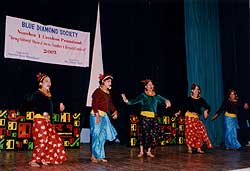 To paraphrase Anup Pahari, speaking at last month's conference on the agenda of change in Nepal, democracy is a sloppy business. He spoke of tabloids and political crises. To that, throw in scandals, irreverent art, loud disagreement with national nostrums and comedians poking fun at almost everything. Add inclusion to democracy and you end up with something even more discomfiting to the comfortable classes, now almost united in their loathing of political parties, human rights groups and all the other noisy sections of society, busy demanding their rights.
To paraphrase Anup Pahari, speaking at last month's conference on the agenda of change in Nepal, democracy is a sloppy business. He spoke of tabloids and political crises. To that, throw in scandals, irreverent art, loud disagreement with national nostrums and comedians poking fun at almost everything. Add inclusion to democracy and you end up with something even more discomfiting to the comfortable classes, now almost united in their loathing of political parties, human rights groups and all the other noisy sections of society, busy demanding their rights. I started to think seriously about some of these things at that conference, and later at a magnificent beauty contest for men dressed as women sponsored by the Blue Diamond Society. That was, in every way, a ground-breaking event. For one thing, it was held at City Hall. Think of it, a gay men's event at a government building in Nepal! And I'm not aware of anyone raising any serious objections to it. None of the usual guardians of orthodoxy and traditional traits of nationality was given space in the newspapers to trot out their tired lies. The event screamed loudly, "WE HAVE GAY MEN IN NEPAL! MANY OF THEM ARE LEARNING TO BE PROUD OF THEIR SEXUALITY!"
Inclusion is a tough business, especially in a society like this that's been exclusionary for so long. And where, evidently, democracy has not widened the social net to include Nepali citizens from outside the caste and economic mainstream. This newspaper has reported on the scandalously mono-caste (Bahun) civil service. Add to that political leaderships from left to right, the business elite, even many NGOs and human rights groups whose boards and top people are uniformly from already-privileged sections of society. Where are the dalits, the Tharus? Hell, where are the women? This country has fewer women in economic and public life than almost any other outside of Saudi Arabia and the Gulf.
There are reasons for this. Despite democracy, definitions of "Nepaliness" have remained intact from earlier days. They have also stayed as the purview of the state or a select and exclusive elite. National dress, patriotic folk songs, poetry about natural beauty and officially sanctioned history are all part of the package. More and more citizens-subject to modern pressures from media, economic migration and generational change-have noticed just how these official definitions are beginning to show signs of severe strain. Eventually, they may simply become irrelevant.
The two boulders on either side of Nepal's yam are often cited as reasons for strict definitions of citizenship. Without a careful and mandated way of expressing nationalism, Nepalis might simply start to behave like North Indians or Tibetans, much as-say-Canadians differ little from Americans, Belgians from the French or Dutch, and Austrians from Germans. Whoa, I can already hear the screams of outrage from those other small countries.
What helps those smaller and larger countries co-exist culturally is not state mandated culture, but inclusion. Gay men, members of ethnic minority groups and, yes, women in Canada, Belgium and Austria have fought hard for inclusive policies in their own countries. By doing so, they have strengthened their nationality. By changing traditional definitions, they have created indigenous, natural change that is resilient and lasting. They have banished outmoded, largely irrelevant orthodoxies that were frayed at the edges and in danger of becoming rotten to the core.
In Nepal, small steps are being taken to broaden the definition of society. Gay men hold a fashion show, the last census allows people to declare their religion rather than simply assume Hinduism. A few political leaders promise inclusion of dalits and other communities, some organisations work tirelessly for the downtrodden. It all helps ensure that the underprivileged will continue to shove outward against the stranglehold of a self-serving-yet massively short-sighted-elite. The comfortable classes will protest, or perhaps they will send their servants out to do so. But they will lose the contest and the nation will emerge as a stronger, more self-confident place.
It's a sloppy business. But someone's got to do it.



